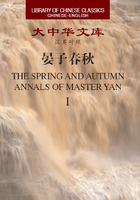
2.15 [40] 景公自矜冠裳游处之贵晏子谏
齐景公自夸帽子衣服巡游居处的贵重,晏子进谏
【原文】
景公为西曲潢,其深灭轨,高三仞,横木龙蛇,立木鸟兽。公衣黼黻之衣、素绣之裳,一(依)〔衣〕而五彩具焉;带球玉而冠且,被发乱首,南面而立,傲然。晏子见,公曰:“昔仲父之霸何如?”晏子抑首而不对。公又曰:“昔管文仲之霸何如?”晏子对曰:“臣闻之,维翟人与龙蛇比,今君横木龙蛇,立木鸟兽,亦室一就矣,何暇在霸哉!且公伐宫室之美,(矝)〔矜〕衣服之丽,一衣而五彩具焉,带球玉而乱首被发,亦室一容矣,万乘之君,而一心于邪,君之魂魄亡矣,以谁与图霸哉?”公下堂就晏子曰:“梁丘据、裔款以室之成告寡人,是以窃袭此服,与据为笑,又使夫子及,寡人请改室易服而敬听命,其可乎?”晏子曰:“夫二子营君以邪,公安得知道哉!且伐木不自其根,则孽又生也,公何不去二子者,毋使耳目淫焉。”
【今译】
2.15 [40] DUKE JING TOOK PRIDE IN THE GREAT VALUE OF HIS CAP AND SKIRT AND THE LIVING QUARTERS OF HIS EXCURSIONS. YANZI REMONSTRATED.
When Duke Jing built the Curved Western Pool,it was so deep that it could submerge a carriage up to its axle. The crossbeams of his threeren-high[1] house were decorated w ith dragons and snakes,and the vertical bars were decorated w ith birds and other animals. The Duke wore an upper garment made of colored and embroidered silk,and the material for his skirt was embroidered with white thread. His clothes featured all five colors; his belt was adorned w ith pearls and jade,and his cap w ith silk cords.[2] His hair hung loose from his head to his shoulders. He stood facing south and looked thoroughly arrogant. Yanzi came for an audience.
The Duke said: “In the past,what was Zhongfu’s Overlord like?[3]
Yanzi bowed his head and did not answer.
The Duke said again: “In the past,what was Guan Wenzhong’s[4] Overlord like?”
Yanzi replied: “I have heard that only the Di people liken themselves to dragons and snakes. But now your house’s crossbeams,my Lord,are decorated w ith dragons and snakes and its vertical bars with birds and other animals—all for the sake of completing a single house.[5] How could you have time to serve as an Overlord? Moreover,you brag of the beauty of your palaces and you boast of the elegance of your clothes,w ith all five colors in one outfit. Your belt is adorned w ith pearls and jade. Your hair hangs loosely from your head to your shoulders—all for the sake of posing in a single house.[6] You,my Lord,are a ruler of ten thousand chariots,yet you direct all your intentions towards vice,and your ethereal and earthly souls are lost. With whom would you plan to become an Overlord?”
The Duke descended to the hall,approached Yanzi and said: “Liangqiu Ju and Yi Kuan have informed me of the completion of the house and for this reason I have secretly dressed up in these clothes so as to have a laugh w ith Ju. Then I sent for you to come also. A llow me to remodel the house and change my clothes before I listen respectfully to your instructions. Would that do?”
Yanzi said: “These two gentlemen manipulated you w ith vice; how would you know the Way? Moreover,if one does not cut a tree from its root,the stump can yield sprouts again. Why don’t you simply dismiss these two gentlemen so that your ears and eyes w ill not be subject to their blandishments?”
注释
[1]A ren 仞,an ancient measure of either five,seven or eight Chinese feet–chi 尺. The Kongcongzi,3.4.10.1/4413,has four chi for one ren.
[2]且→ 组 (JS,137/8).
[3]仲父 was one of the several appellations of Guan Yiwu 管夷吾 (720–645 BCE),cognomen Zhong 仲,the famous minister of the State of Qi. His reforms made the State of Qi the most pow erful state in the realm and ultimately led Duke Huan 桓公(d. 643 BCE) to be recognized as the first Overlord of all the princes. See Item 1.9 [9],note 53. For the Guanzi’s lengthy discussion of ba 霸 (“Overlord”) see A llyn W. Rickett,tr. Guanzi: Political,Economic,and Philosophical Essays from Early China. Princeton Library of Asian Translations,Princeton (1985): vol. 1,pp. 348-365.
[4]管 “文” 仲→管 “敬” 仲 (JS,137/10). Obviously,Duke Jing m istakenly interprets Yanzi’s silent response as a protest against the Duke’s disrespectful reference to Guan Zhong’s cognomen (“Zhong”) 仲 rather to his posthumous name Jing “敬.”
[5]亦室一就矣→亦就一室矣 (JS,137/12).
[6]亦室一容矣→亦容一室矣 (JS,ibid).